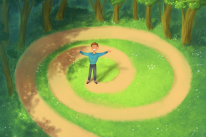
“Love and compassion are necessities, not luxuries. Without them, humanity cannot survive.” ~Dalai Lama
Though Valentine’s Day is coming up next month, this is not a post about romance. It’s about any relationship—with your brother, your mother, your coworker, or your friend.
And I admit I am not an expert.
I’ve made a million and one mistakes in relationships. I’ve expected too much. Or not asked for what I needed in fear of rocking the boat. I’ve been competitive. I’ve been suspicious. I’ve been dependent. I’d like to think what redeems me from all these mistakes is that I’ve also been honest.
Being self-aware, in my opinion, is far more valuable than being perfect—mostly because the former is attainable and helpful, while the latter is neither.
Relationships are not easy. They mirror everything we feel about ourselves. When you’ve had a bad day, the people around you seem difficult. When you’re not happy with yourself, your relationships seem to be lacking.
If you’ve ever gotten in a fight only to find yourself wondering what you were really upset about, this post may help you. If you’ve ever been disappointed because someone didn’t meet your expectations, this post may help you, too. Feel walked on and unheard? You guessed it—there’s likely something in here that will help you change that.
We don’t live in a vacuum. We have thoughts and feelings that can be confusing. Other people do too. And just like in the movie Crash, they don’t always collide smoothly.
When I apply these ideas, I feel confident, strong, compassionate, and peaceful in my interactions. I hope they can do the same for you.
1. Do what you need to do for you.
Everyone has personal needs, whether it’s going to the gym after work or taking some alone time on Saturday morning. If someone asks you to do something and your instinct is to honor your own need, do that. I’m not saying you can’t make sacrifices sometimes, but it’s important to make a habit of taking care of yourself.
Someone once told me people are like glasses of water. If we don’t do what we have to do to keep our glass full, we’ll need to take it from someone else—which leaves them half full. Fill your own glass so you can feel whole and complete in your relationships.
2. Give people the benefit of the doubt.
It’s tempting to doubt people—to assume your boyfriend meant to hurt you by not inviting you out with his friends, or your friend meant to make you feel inadequate by flaunting her money. People who care about you want you to feel happy, even if sometimes they get too wrapped up in their own problems to show it well.
Sometimes they may be hurtful and mean it—let’s not pretend we’re all angels. But that won’t be the norm. It will likely be when they’re hurting and don’t know what to do with it. Odds are they’ll feel bad and apologize later. If you want to get good will, share it by seeing the best in the people you love. When we assume the best, we often inspire it.
3. Look at yourself for the problem first.
When you feel unhappy with yourself, it’s easy to find something wrong in a relationship. If you blame another person for what you’re feeling, the solution is on them. But this is actually faulty logic. For starters, it gives them all the control. And secondly, it usually doesn’t solve the problem, since you didn’t actually address the root cause.
Next time you feel the need to blame someone for your feelings—something they did or should have done—ask yourself if there’s something else going on. You may find there’s something underlying: something you did or should have done for yourself. Take responsibility for the problem and you have power to create a solution.
4. Be mindful of projecting.
In psychology, projecting refers to denying your own traits and then ascribing them to the outside world or other people. For example, if you’re not a loyal and trusting friend, you may assume your friends are all out to get you. It’s a defense mechanism that allows you to avoid the discomfort of acknowledging your weaknesses. There’s no faster way to put a rift in your relationships.
This comes back to down to self-awareness, and it’s hard work. Acknowledging your flaws isn’t fun, but if you don’t, you’ll continue seeing them in everyone around you. And you’ll continue to hurt. Next time you see something negative in someone else, ask yourself if it’s true for you. It might not be, but if it is, identifying it can help create peace in that relationship.
5. Choose your battles.
Everyone knows someone who makes everything a fight. If you question them about something, you can expect an argument. If you comment on something they did, you’ll probably get yelled at. Even a compliment could create a confrontation. Some people just like to fight—maybe to channel negativity they’re carrying around about the world or themselves.
On the one hand, you have to tell people when there’s something bothering you. That’s the only way to address problems. On the other hand, you don’t have to let everything bother you. When I’m not sure if I need to bring something up, I ask myself these few questions:
- Does this happen often and leave me feeling bad?
- Does this really matter in the grand scheme of things?
- Can I empathize with their feelings instead of dwelling on my insecurity?
6. Confront compassionately and clearly.
When you attack someone, their natural instinct is to get defensive, which gets you nowhere. You end up having a loud conversation where two people do their best to prove they’re right and the other one is wrong. It’s rarely that black and white. It’s more likely you both have points, but you’re both too stubborn to meet in the middle.
If you approach someone with compassion, you will likely open their heart and mind. Show them you understand where they’re coming from, and they may be more willing to see your side. That gives you a chance to express yourself and your expectations clearly. And when you let people know what you need at the right time in the right way, they’re more likely to give that to you.
7. Don’t be afraid to be vulnerable.
There are all kinds of ways you can feel vulnerable in relationships: When you express your feelings for someone else. When you’re honest about yourself or your past. When you admit you made a mistake. We don’t always do these things because we want to maintain a sense of power.
Power allows us a superficial sense of control, whereas true, vulnerable being allows us a sense of authenticity. That’s love: being your true self and allowing someone else to do the same without letting fear and judgment tear it down. It’s like Jimi Hendrix said, “When the power of love overcomes the love of power the world will know peace.”
8. Think before acting on emotion.
This one is the hardest for me. As soon as I feel hurt, frustrated, or angry, I want to do something with it—which is always a bad idea. I’ve realized my initial emotional reaction does not always reflect how I really feel about something. Initially, I might feel scared or angry, but once I calm down and think things through, I often realize I overreacted.
When you feel a strong emotion, try to sit it for a while. Don’t use it or run from it—just feel it. When you learn to observe your feelings before acting on them, you minimize the negativity you create in two ways: you process, analyze, and deal with feelings before putting them on someone else; and you communicate in a way that inspires them to stay open instead of shutting down.
9. Maintain boundaries.
When people get close, boundaries can get fuzzy. In a relationship without boundaries, you let the other person manipulate you into doing things you don’t want to do. You act out of guilt instead of honoring your needs. You let someone offend you without telling them how you feel about it. The best way to ensure people treat you how you want to be treated is to teach them.
That means you have to love and respect yourself enough to acknowledge what you need and speak up. The only way to truly have loving relationships is to start with a loving relationship with yourself.
10. Enjoy their company more than their approval.
When you desperately need someone’s approval, your relationship becomes all about what they do for you—how often they stroke your ego, how well they bring you up when you feel down, how well they mitigate your negative feelings. This is draining for another person, and it creates an unbalanced relationship.
If you notice yourself dwelling on pleasing someone else or getting their approval, realize you’re creating that need. (Unless you’re in an abusive relationship, in which case I highly recommend getting help.) Instead of focusing on what you can get from that person, focus on enjoying yourselves together. Oftentimes the best thing you can do for yourself and someone else is let go and give yourself permission to smile.
What do you do to create peaceful, loving relationships?
About Lori Deschene
Lori Deschene is the founder of Tiny Buddha. She started the site after struggling with depression, bulimia, c-PTSD, and toxic shame so she could recycle her former pain into something useful and inspire others to do the same. You can find her books, including Tiny Buddha’s Gratitude Journal and Tiny Buddha’s Worry Journal, here and learn more about her eCourse, Recreate Your Life Story, if you’re ready to transform your life and become the person you want to be.
- Web |
- More Posts













 Though I run this site, it is not mine. It's ours. It's not about me. It's about us. Your stories and your wisdom are just as meaningful as mine.
Though I run this site, it is not mine. It's ours. It's not about me. It's about us. Your stories and your wisdom are just as meaningful as mine.
[…] post, 10 Ways to Have Loving, Peaceful Relationships may help you relate to people with respect and affection–and receive them in return. […]
Hmm. I'm not sure I'd use the word “boundaries” in point 9, since to me that implies shutting others out rather than opening up. My preferred reading of that point is “maintain self-respect”. This might have to do with limits or values, but it really comes down to respecting oneself.
What do you think?
I’ve been learning a lot about boundaries lately primarily because I don’t set them and then wind up wondering why people treat me the way they do. I respect myself but without making those boundaries, I can’t expect others to respect me.
Excellent point. I can relate. I’ve been working on boundaries for a long time, and I suspect it will always take some effort.
I personally believe boundaries are crucial to healthy relationships, not to shut people out, but rather to maintain a sense of individual self within that relationship. I’ve seen many people lose themselves in friendships and romantic relationships; forgetting to ask for what they need because they want to please the other people.
So it’s not so much a matter of shutting yourself off from people. It’s about being able to both honor your needs and vocalize them.
Thank you for offering your thoughts!
this is so perfect for me! changed my perspective. thank you so much 🙂
You’re most welcome!
[…] Ten Ways to Have Peaceful, Loving Relationships […]
i like to maintain boundaries.
I really enjoyed reading this post and will be sharing it on my facebook fan page. I especially appreciate the points you made about giving others the benefit of the doubt and bettering relationships from the inside out (beginning with yourself.)
Thank you.
I’m glad you enjoyed it. Thank you for sharing your thoughts!
Beautifully written. Now I will forward it to my girlfriend 🙂 We fight for no reason then suddenly at the end of the day there is burst of emotions and love. I suspect we’ve been neglecting some of the stuff mentioned in here. Thanks!
You’re welcome. I’m glad you find this post helpful!
I’m so glad you found it helpful. Happy Thursday!
[…] 10 Ways to Have Peaceful, Loving Relationships […]
Wow, there is nothing more to add! U’ve said everything, really! Every point was on target! 🙂
regarding #6, did Buddha ever confront? I would not think so…
I understand your concern that confronting people may not be Buddha-like; however, I still think it’s necessary in healthy relationships. Confronting doesn’t have to imply a hostile confrontation; I was more referring to addressing your thoughts and concerns with people. Keeping the lines of communication open and expressing yourself, instead of holding it in, which can create worse problems down the line.
Does that make sense?
Yes, it does. I do not like confrontation. However, getting your point across is sometimes necessary, despite potential conflict that might arise This is esp. true if this relates to your well-being. There is no need to be hostile. Sometimes, I feel it is best just to spell it out. And if it is uncomfortable, well, then maybe there is a reason why it needs to be said. Some people may not realize how unhappy they have made someone until they hear it. And I know it sounds ridiculous inside the mind, but once it is spoken they either need to address or change their behavior.
The Buddha never told us to not confront someone who you think has hurt your feelings. It is hostile or confrontation out of pure anger is what we should avoid. Confront with compassion. Thich Nhat Hanh said that when you feel hurt by someone you love, tell your loved ones “darling, i am suffering”.
Awesome! its very helpful to me,thanks a lot!
[…] About People And The World 10 Minutes …Violently Peaceful: Oppression through ?Staying Calm …10 Ways to Have Peaceful, Loving Relationships | tinybuddha.comHyderabad- An epitome of cultural diversity and love? / ghumakkar.comLearn and Develope Mental […]
[…] Trusting people is one of the most difficult things to do. Sometimes we suspect others because we’re measuring them against past relationships. Other times it’s because we’re projecting our own weaknesses onto them (as previously discussed in this post). […]
[…] Trusting people is one of the most difficult things to do. Sometimes we suspect others because we’re measuring them against past relationships. Other times it’s because we’re projecting our own weaknesses onto them (as previously discussed in this post). […]
[…] Trusting people is one of the most difficult things to do. Sometimes we suspect others because we’re measuring them against past relationships. Other times it’s because we’re projecting our own weaknesses onto them (as previously discussed in this post). […]
Awesome! its very helpful to me,thanks a lot!
[…] affects every aspect of my life: my hobbies, skills, my relationships, and even the understanding I have of my body, physical appearance, and my mental health. I often […]
This is a terrific article and couldn’t be more timely! Thank you SO much!
[…] with things that matter to you? Are you actively pursuing a path that fulfills you? Do you maintain healthy relationships that make you feel good about […]
Dear GOD I needed to hear this today. All of it. Thank you so much.
[…] like I described in 10 Ways to Have Loving, Peaceful Relationships: people are like glasses of water. If you don’t do what you have to do to keep your glass full, […]
Perfect day for a perfect summary – couldn’t have said it better or summarized my own feelings today better..
The really hard part is remembering to apply all this in everyday life. Especially numbers 3 and 8 – you only notice you’ve neglected them after it’s happened.
Great reminders! Something we all need to hear from time to time. I’m bookmarking this post.
This article couldn’t have come into my hands at a better time. #4 described a painting I was just finishing perfectly. The name of my painting is “what is about me that you don’t like about yourself?” I couldn’t have explained it any better. Please read by blog where I posted about it.
http://www.ritamariagallery.com/Rita_Maria_Gallery/Blog/Blog.html
I visited your blog…very cool! I love your painting, and I’m honored you included some of my words in your post =)
FANTASTIC article! I am posting it on my Facebook wall, and re-reading a few more times. You skillfully addressed the most important relationship obstacles in a very succinct, practical, and easy to read way. Bravo, Lori!
Love this article. Really great ideas on how to keep on that positive track. Thanks! 🙂
wow, thank you a million times ♥
[…] This post was mentioned on Twitter by HeaT. HeaT said: 10 Ways to Have Peaceful, Loving Relationships | tinybuddha.com http://bit.ly/bmjtDU […]
Dear Lori, Thank you so much for writing this article….there are so many like it floating around the web, and even so many of these thought processes I’ve explored perpetually myself and yet?…none that really speak with the pin point impeccability and integrity you’ve managed to express here. Such a gift. Thank you, thank you, thank you! and please keep writing…
You’re most welcome–and thank you for the kind words =)
Also I did think of another way to create peaceful loving relationships…reminding yourself that this interaction is “bigger than you” bigger than any one person or relationship but really is about the larger picture of how we contribute to the energy in the world and what we want our world of interactions to look like as we are all connected. Just that one thought “this is bigger than me or this relationship” can sometimes unlock your own inhibitions tied up in your own personal agenda and give way for a greater sense of purpose, unattached to the reaction of the person, to flow through you
I really liked this post, it was like looking at a reflection of myself. I think in the same ways and it’s was hopeful to see I’m not the only one (these “values”, as I call them, are extremely important to me in a relationship).
Also, this is going in my quote book.
“Being self aware, in my opinion, is far more valuable than being perfect–mostly because the former is attainable and helpful, while the latter is neither”
[…] 10 Ways to Have Peaceful, Loving Relationships […]
love your blog ! get the emails everyday and really enjoy the insight
I never saw this comment before, so my apologies for the insanely late reply–but thank you! I’m so glad you enjoy Tiny Buddha!
[…] 10 Simple Ways to Have Peaceful, Loving Relationships […]
[…] 10 Ways to Have Peaceful, Loving Relationships SHARETHIS.addEntry({ title: "50 Things to Love about Life That Are Free", url: "http://dev.tinybuddha.com/blog/50-things-to-love-about-life-that-are-free/" }); Share tweetmeme_style = 'compact'; tweetmeme_url = 'http://dev.tinybuddha.com/blog/50-things-to-love-about-life-that-are-free/'; tweetmeme_source = 'tinybuddha'; […]
[…] You May Also Enjoy Reading: 10 Ways to Have Peaceful, Loving Relationships […]
[…] 33. Giving someone you love the benefit of the doubt to put your mind at ease and maintain a peaceful relationship. […]
[…] 10 Ways to Have Loving Peaceful Relationships […]
[…] now a little less than two years into a peaceful, loving relationship, and I realize the journey to this connection had more to do with loving myself than finding him. […]
[…] don’t blame her, though. She is an amazing, beautiful, brilliant woman. It wasn’t a healthy relationship which made things hard on her–I get that. In a way I’m grateful for this. It was a wake-up […]
[…] 10 Ways to Have Peaceful, Loving Relationships […]
Great point noted.
very much help full to keep the relation ship in a good & loving way.
thanks for the post.
[…] experts say that one of the secrets to keeping a relationship healthy is […]
[…] rarely is it black and white. Once you own your part, now you can use that knowledge to create more peaceful relationships going […]
[…] was desperate for a loving relationship and a career. My battles were hindering me from achieving […]
[…] we don’t see each other nearly as often now, our friendship is stronger and healthier than […]
Great for the great article and the many new insights you have given me. I certainly will think about ”do what you need to do for you” idea. I often try please everyone, but it makes me often angry eventually. Also creating boundaries is a great one. When you all too close with someone for too long your relationships get worse. I’m a diy solar panels for home use enthusiast myself.
My boyfriend and i are having so many problems! We fight over everything and were both the type that is stubborn and have to get the last word…He’s the type that he dosen’t know how to express his feelings and when he’s mad about something he takes it out on me…Don’t get me wrong he’s NEVER hit me or anything, but he shuts himself off from me and the rest of the world. When he’s mad, yes he’ll cuss at me if i ask him more than once what’s wrong but anyways, this post really helped me understand and look at things in a different way than i use to. Thanks. – Ashton Jordan
I’m sorry to hear you and your boyfriend are having problems. I hope this posts helps you both communicate better! I think good communication is the cornerstone of all healthy relationships. It’s not easy, but so worth it.
[…] What was the main thing that made you finally strong enough to break off a bad relationship? I'm al…> I'm almost 50 years. I've been with him for 2 and a half years. Almost everything has now gone bad in our relationship. But for some reason I still don't have the strength to do the right thing. How did you get strong and finally do what has to be done? […]